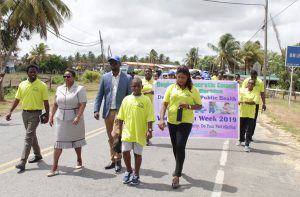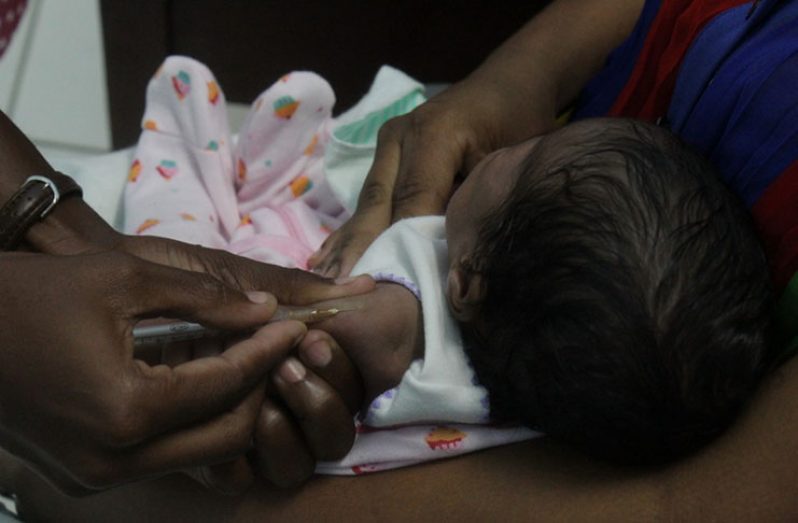— says Min. Lawrence at launch of Vaccination Week in the Americas 2019
PUBLIC Health Minister Volda Lawrence has affirmed that government will continue work geared at fostering equitable immunisation coverage across all administrative regions to safeguard the population from a myriad of preventable diseases.
“Vaccination increases the immunity of a child which benefits not only the family and the child but also the community,” Minister Lawrence told a gathering of healthcare workers at the High Dam Health Centre, in Region Five. She was at the time ushering in the launch of Vaccination Week in the Americas 2019.

The United Nations Sustainable Development Goals (SDGs), goal number three, calls for the promotion of healthy lives and well-being for all at all ages.
“It is with this in mind that our immunisation programme is established in all our 10 administrative regions,” the minister said, noting that through the Expanded Programme on Immunisation (EPI), Guyana continues to have coverage above 90 per cent for all the under one antigens.
She said the partnership between parents, who continue to “trust the system” and healthcare workers, who provide the services, has been instrumental in promoting immunisation coverage.
Guyana currently provides protection against 17 antigens, with the newest addition being the Human Papilloma Virus (HPV) vaccine and the Hepatitis B birth dose.
“Soon after birth we know that our babies receive their BCG (the Bacillus Calmette–Guérin vaccine which is primarily used against tuberculosis)… which the health system implements in an effort to begin the process of immunity from communicable diseases,” the minister reminded, adding: “And many of these diseases can be prevented and that is what we are trying to do.”
DEDICATED
Though she hailed the work of all medical professionals who work daily to ensure that the population is immunised, she singled out the work done by those Community Health Workers (CHWs) in the hinterland regions.
“Those CHWs don’t quarrel about transportation because in some places there are no roads. They can’t call a taxi and in many times, they can’t ‘bum’ a drop like you can do on the coast. They either have to ‘foot it’, sometimes they go by motorcycles on very, very dangerous paths and many times they are up the rivers and down the creeks in order to ensure that our people are vaccinated,” Lawrence highlighted.
She disclosed that the Health Ministry’s yearly review on the EPI has demonstrated that vaccination services are not evenly demonstrated across all regions. There is less coverage in the hinterland regions.
“Clearly, those records indicate disparities in access to services. For us on the coastland, we are doing well; we are doing excellent in terms of coverage of all our antigens…. But there are some factors which inhibits us from doing the same for our people in the hinterland,” she lamented.
“Think about that health worker with the icebox on her back with a few pieces of food, a bottle of water and she’s climbing several hills or going over the mountain or going down the mountain just to meet a few persons just to ensure that they too are vaccinated. When I speak of the challenges, that is what I speak of; I speak of the medex or CHWs or nurse in a little bahaloo paddling up or down a river or creek just to get to a few communities to ensure our people are immunised.”
But even with these challenges, she acknowledged that the country is generally recording excellent coverage and that the government will continue to protect the population’s health through vaccination since it has been proven to be a “cost-effective measure with high impact on a population’s health”.
REACHING EVERYONE
“We have to ensure that we continue to work to ensure that our services and our service providers can continue to provide vaccination for our people irrespective of where [they are],” she stressed, and hastened to add: “But we have to ensure that we improve where they do it. As a ministry moving forward with the EPI, we do have a vested interest in finding innovative solutions to address the current challenges that hinge on providing the necessary services to our population.”
The minister joined health workers of Region Five in marching to encourage persons to “Get Vax now!”

Members from the public health sector of Suriname were also present at High Dam to commemorate the launch of the week. The minister hailed this as significant since the two countries support each other in providing cross-border health care.
Representative of the Pan-American Health Organisation/ World Health Organisation (PAHO/WHO), Dr. Paul Edwards noted, too, that the week of observances is an “extraordinary effort” led by countries of the Americas to promote equitable access to vaccination, particularly in reaching out to populations with little access to the services.
Dr. Edwards also detailed that the history of vaccination week of the Americas dates back to 2003 when there was a measles outbreak in 2002. And since then, he shared that some 323 million persons of all ages have been vaccinated for preventable diseases through activities conducted under the framework of the vaccine week.
Guyana’s EPI was introduced in the late 1970s, according to him, with vaccinations against measles, tetanus, whooping cough, polio, diphtheria and tuberculosis.
“The last case of Yellow Fever was in 1968; measles in 1961 and the last case of polio was in 1962,” he shared. At the end of 2018, however, the EPI programme now offers additional antigens against a host of other diseases.
“This programme has certainly expanded from a child immunisation programme to a family immunisation programme,” Dr. Edwards noted.
But while Guyana has solidified itself as a country that places much emphasis on immunisation through vaccination, he reminded that there have been recent outbreaks in neighbouring countries.
Due to outbreaks of measles, diphtheria and Yellow Fever, specifically in bordering countries, Edwards noted there is a need to intensify vaccination activities in all of those countries.



.jpg)








